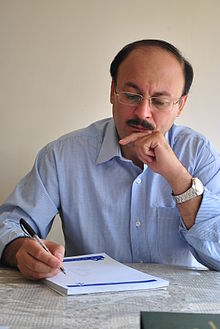Bijan Abdolkarimi
Bijan Abdolkarimi (Persian: بیژن عبدالکریمی ) | |
|---|---|
 | |
| Born | 1963 |
| Era | 21st century Philosophy |
| Region | Western Philosophy |
| School | Continental |
Main interests | Philosophy Postmodernism |
Notable ideas | Nietzscheian World, The end of theology |
Bijan Abdolkarimi (born 1963 in Tehran) (Persian: بیژن عبدالکریمی ) is an Iranian philosopher, thinker, translator and editor.[1][2][3] He is associate professor of philosophy at Islamic Azad University (North-Tehran branch).[4] His main interests are Heidegger's philosophy, postmodernism, political philosophy and existentialism.[5] He claims to challenge the dominant ideological discourse in Iran.[6][7] He has participated in debates at Iranian universities and also in IRIB TV4 in which he has opposed the notion of Islamic humanities.[8][9] [10][11] He is also a scholar of Heidegger's thought and philosophy.[12][13] Abdolkarimi received his PhD from Aligarh Muslim University in 2002.
Views
The main characteristics of Abdolkarimi's thought may be summarized as follows:
- Abdolkarimi seeks to present a spiritual, meditative interpretation of Heidegger's thought.[14]
- The relation between the West and East is his main issue in his philosophical thinking. He strongly criticizes any ideological, theological understanding of the West and East. He emphasizes on a historical, phenomenological understanding of the West and East.[15]
- He set forth the theory of "The end of theology" and it has a very critical connotation, as well as Abdolkarimi's other points of view in Islamic Republic of Iran. Following G. Vattimo, Italian philosopher, he believes that the main philosophical characteristic of our time is "the destroyed ontology". Abdolkarimi interprets Vattimo's idea in this way that "our time has become metaphysic-less". But in the context of Abdolkarimi's thought, the term "metaphysics" is not merely in the Greek sense but includes every historical theoritical tradition.[16][17]
- Abdolkarimi believes that the human being's future thought is a kind of nonsecular-nontheological thinking, namely a way of thinking that is in disagreement to the secular, materialistic interpretation of the world, but at the same time does not settle in any historic, theological systems.[18]
Bibliography
- Reflections on the Paradox of Directed Democracy, Eshraghieh Press, Tehran, 1989.
- Shariati and Being Politicized, Resa Institute of Cultural Service, Tehran, 1995.
- Thought and Politics, Tehran, Scientific & Cultural Press (Affiliated to The Ministry of Science and Technology), 1977.
- The Story of Me and Thou, Tehran, The Press of the Institute of the Critique of Culture, 2001.
- Heidegger and Transcendence (A commentary of Heidegger's Interpretation of Kant's Critique of Pure Reason), Tehran, The Press of the Institute of the Critique of Culture, 2002.
- Emancipation or Dominance? (A Critique of the System of Religious Education in Iran), with Mohammad Ali Mohammadi’s cooperation, Tehran, The Press of the Institute of the Critique of Culture, 2002.
- Monism or Pluralism? (Mobile Thinking or Homeless Thought) (A Critique of Dr. Daryoush Shaygan’s Modern Enchantedness), Tehran, The Press of the Institute of the Critique of Culture, under printing.
- Nietzscheian World and Us, Elm Publication, Tehran, 2009.
- Hegel or Marx? (A Critique of Iranian Intellectuals), Tehran, The Press of the Institute of the Critique of Culture, 2002.
See also
Sources
- ^ "Abdolkarimi: Shariati's thought copes with Nihilism". Iran Book News Agency. Retrieved 22 August 2012.
- ^ "Schopenhauer; philosopher of culture and virtue". Iran Book News Agency. Retrieved 22 August 2012.
- ^ "شوپنهاور فیلسوف فضیلت و فرهنگ است". Farheekhtegan Newspaper. Retrieved 22 August 2012.
- ^ "استادان گروه فلسفه دانشگاه آزاد اسلامی واحد تهران شمال (Professors of Philosophy at Azad University)". Islamic Azad University. Retrieved 22 August 2012.
- ^ "ژورنالیسم و فلسفه در گفتگو با بیژن عبدالکریمی". Hamshahri Online. Retrieved 22 August 2012.
- ^ "عبدالکریمی از مواجهه توتالیتر با متن سخن گفت". Iran Book News Agency. Retrieved 22 August 2012.
- ^ Arzhang, Amin (23). "Criticism of Islamic humanities". Shargh Newspaper.
{{cite journal}}: Check date values in:|date=and|year=/|date=mismatch (help); Unknown parameter|month=ignored (help) - ^ "عبدالكريمي: مطهری در درک عقلانیت مدرن از نوعی عقب ماندگی تاریخی رنج می برد / قائمي نيا: امتياز مطهري جهش از مباحث سنتي به مباحث جهان معاصر است". Daneshju News Agency. Retrieved 23 August 2012.
- ^ "مناظره پارسانيا و عبدالكريمی درباره علوم انسانی برگزار میشود". Iranian Quran News Agency. Retrieved 23 August 2012.
- ^ "عبدالكريمي: علوم انسانی اسلامی یک عبارت پارادوکسیکال و خود متناقض است". Daneshju News Agency. Retrieved 23 August 2012.
- ^ "طرح اسلامیسازی علوم انسانی شرقشناسی وارونه است". Fars News Agency. Retrieved 23 August 2012.
- ^ Jarvie, Ian Charles (2006). Karl Popper: Life and time, and values in a world of facts. Ashgate Publishing, Ltd. p. 152. ISBN 0754653757, 9780754653752.
{{cite book}}: Check|isbn=value: invalid character (help) - ^ "گفت وگوي "ايران" با دكتر بيژن عبدالكريمي: طنز تلخ هايدگر در ايران". Iran Newspaper. Retrieved 23 August 2012.
- ^ "بيژن عبدالكريمي :"هايدگر در ايران" تا اتمام نگارش جلد دوم منتشر نميشود". Farhangkhaneh Institution. Retrieved 23 August 2012.
- ^ "دکتر عبدالکریمی: دعوت بزرگ شریعتی، تجدید عهد با سنت تاریخی ماست". Academy of Iranian Studies in London. Retrieved 23 August 2012.
- ^ "تفكر تئولوژيك". Shargh Newspaper. Retrieved 23 August 2012.
- ^ Interview With IRIB's Channel 4, September 2011
- ^ "جهان نيچهاي بي معناست". Fars News Agency. Retrieved 23 August 2012.
